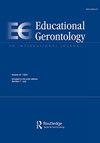评估2019冠状病毒病期间老年人虚拟4周数字扫盲计划:一项试点研究
IF 1.5
4区 教育学
Q3 EDUCATION & EDUCATIONAL RESEARCH
引用次数: 0
摘要
年龄较大的成年人越来越依赖于使用技术与全球各地的其他人联系和交流。自2019冠状病毒病大流行以来,这一观点变得更加明显。虽然许多老年人已经提高了使用这些技术的技能,但更多的老年人缺乏必要的知识和技能,无法有效地从这些技术的使用中受益。为了给老年人提供方便、方便的数字培训,我们在2021年夏天试点了一个为期4周的简短数字扫盲计划,培训老年人使用电脑的关键技能,如发送电子邮件或浏览网页等。5名老年人自愿参加了这项简短的干预研究,他们每周参加两次1.5小时的干预,为期4周(共8次)。每堂课的主题都不一样。结果表明,干预后的平均计算机熟练程度得分高于干预前。此外,干预后在计算机基础、沟通和互联网量表上的得分较高。所有会议通常都在提议的时间内完成。确定的主要技术问题与连接到数字会话以及跨设备导航应用程序界面(即iOS和Android设备之间图标或应用程序名称的差异)有关。总的来说,这些发现表明,如果得到良好的支持,老年人可能能够在短时间内迅速获得数字识字技能。披露声明:sr曾获得法国医学研究基金会(FRQS)颁发的临床研究员奖,并拥有AIfred Health公司的股份。HS拥有CIHR奖学金奖和AGE-WELL奖。其他共同作者没有其他利益冲突需要申报。概念与方法:KE, JG, SE;分析和数据管理:SE;起草、撰写、编辑:SE、JG;监督、项目管理和资金获取:SR、JG、SE;对手稿的批判性审查、评论和修订做出重大贡献:KE、SNB、SR、HS。所有作者都已阅读并同意稿件的出版版本。本项目经费来源:CIHR [Grant # PJ8-169696];CIHR [Grant # PJT-175191];FRQS - [Grant # 2022-VIAP-308195];JGH基础。本文章由计算机程序翻译,如有差异,请以英文原文为准。
Evaluation of a virtual 4-week digital literacy program for older adults during COVID-19: a pilot study
ABSTRACTOlder adults have become more dependent on using technologies to connect and communicate with others across the globe. This insight has since become more evident with the COVID-19 pandemic. While many older adults have increased their skills with these technologies, many more lack the necessary knowledge and skillset to effectively benefit from their use. To provide them with an accessible and older adult friendly digital training, in the summer of 2021, we pilot tested a brief 4-week digital literacy program to train older adults on key skills related to navigating their computer such as sending e-mails or traversing the web, etc. A convenience sample of 5 older adults volunteered for this brief intervention study in which they were to participate in a 1.5-hour intervention twice a week, for 4 weeks (8 total sessions). Topics varied from class to class. Results suggest that average computer proficiency scores were higher post intervention compared to pre-intervention. Additionally, post intervention scores were higher on computer basics, communication, and Internet subscales. All sessions were typically completed within the proposed time. The main technical issues identified were related to connecting to the digital sessions as well as navigating application interfaces across devices (i.e., differences in icons or application names between iOS and Android powered devices). Overall, these findings would suggest that older adults may be able to quickly gain digital literacy skills in a short period of time, provided that they are well supported. Disclosure statementSR received a clinician-investigator award from the Fonds de Recherche Québec Santé (FRQS) and owns shares in AIfred Health. HS has a CIHR fellowship award and an AGE-WELL award. The other coauthors have no other conflicts of interest to declare.Author contributionsConceptualization and methodology: KE, JG, SE; analysis and data curation: SE; draft preparation, writing and editing: SE, JG; supervision, project administration and funding acquisition: SR, JG, SE; substantial contribution to the critical review, commentary, and revision of the manuscript: KE, SNB, SR, HS. All authors have read and agreed to the published version of the manuscript.Additional informationFundingSources of funding for this project: CIHR [Grant # PJ8-169696]; CIHR [Grant # PJT-175191]; FRQS - [Grant # 2022-VIAP-308195]; JGH Foundation.
求助全文
通过发布文献求助,成功后即可免费获取论文全文。
去求助
来源期刊

Educational Gerontology
Multiple-
CiteScore
2.50
自引率
13.30%
发文量
80
期刊介绍:
This well-respected journal offers up-to-date original research in the fields of gerontology, adult education, and the social and behavioral sciences. Researchers from around the world will benefit from the exchange of ideas for both the study and practice of educational gerontology. Papers published in the journal will also serve as authoritative contributions to the growing literature in this burgeoning field. Educational Gerontology is the only international journal of its kind to publish twelve issues per volume year. Articles featuring outcome-based practical educational resources in gerontology for the educational professional, care provider, trainer, and student in such areas as: art, music, drama and recreational therapies; mental health, communication arts, social programs and policies; and, social work, nursing, physical and occupational therapies, financial planners, architecture and interior design, family relations and therapy, and religion and spirituality.
 求助内容:
求助内容: 应助结果提醒方式:
应助结果提醒方式:


